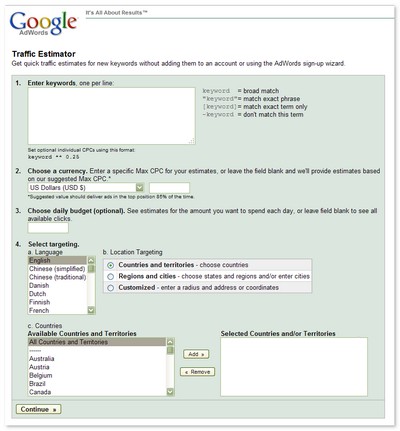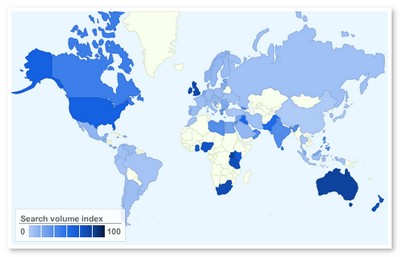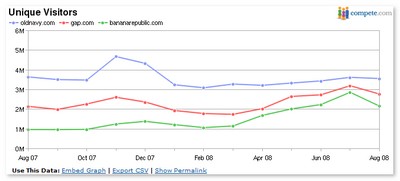Only two minutes work a year!
I'm a complete idiot, and if I can do it, anyone can!
If you've ever researched making money online, no doubt you've heard the above pitch. We all know the pitch is nonsense, of course. If these guys really were hitting the numbers they claim, then you've got to wonder why they are selling their "secrets" for $97?
Perhaps it is true.
Perhaps they really are idiots :)
However, the reality is that making money online is the same as making money offline. You need to find a market opportunity and fill it.
And that takes work.
I'd like to share a few ideas on research potential markets, and how you can use search engines to help you.
Definition Of Market Research
Market research is the study of groups of people in order to determine if there is a market for your product or service.
One of the biggest mistakes entrepreneurs often make is to attempt to solve a non-problem. The TechCrunch dead-pool is littered with examples of solutions to non-problems. An idea might sound good. Your family and friends might agree it is good. But is it really? How can you really know?
By spending a little time finding out if your idea solves a real problem, as opposed to an imaginary one, you can save yourself a lot of time, effort, pain and money later on.
But how do you undertake market research on a limted budget?
Use Search As A Market Research Tool
Search marketers have an ace up their sleeves that most people just don't see. One of the valuable most valuable market research tools available costs very little: Google Adwords.
Google Adwords provides you with a wealth of data. You can measure actual visitor interest - real search numbers, not just estimates - and you can quickly and easily test your ideas in the live marketplace. You can test your product or service offer, even before you're ready to provide it!.
Once you've gathered this valuable data, and found that your idea works, you can then design your time-consuming SEO strategy.
Sounds easy, right?
Well, it is. But there is a little work involved.
What we need to do is take a few important measurements.
1. Keyword Research
You can use the Adwords KeyWord Tool, or other keyword research tools. And try free keyword research tool from SEOBook. Include every keyword term in your Adwords campaign that you expect to rank for in your organic campaign.
2. Construct a small site consisting of landing pages.
You can test the effectiveness of each landing page using a/b testing, but this would probably over-complicate matters at this stage. What you want to know are three key pieces of information: actual search volume, response to offer, and competition levels.
- Search volume is the number of people who search on a certain term. The actual search volume, as opposed to estimates.
- Response to offer is the number of people who take a desired action, not those who click back.
- Competition level is the level of advertisers competition.
If the search volume is sufficient to achieve your goals, then you're part way there. If not, you might to to rework your idea, but at least you haven't undertaken a time consuming SEO campaign only to find this out there is no real traffic.
Once a visitor lands on your page, you want to measure their level of interest in your offer. How many buyers are you likely to get vs tire kickers? Prompt the visitor to take an action that would indicate that they would buy your service or product. For example, you could send them to an affiliate program offering a similar service or product, and measure your success rates, or collect the visitors email address as an expression of interest. Those who click back are telling you your offer is quite right.
3. Evaluate Competition Levels
You can gain an understanding of the competition levels by looking at the bid price. Obviously, the higher the bid prices, the higher the level of competition. If you're failing to get on the front page with reasonable relevancy and bids, you're in a fairly competitive area, and the SERPs will be likewise.
Let's say you've got all three ducks lined up. Great. You now have some fantastic market research data that you can build into your site and into your SEO campaign. Most offline market researchers would kill to be able to get this lucrative data so easily and cheaply.
Other Useful Market Research Tools

Google Trends shows trends in searches over time. You want to find terms that are becoming increasingly popular. You can then optimize for these terms, and enjoy the rising traffic levels.

Google Traffic Estimator helps you see how often your ads would appear for keywords, and gives you approximate prices. It works for various match types, including broad match, phrase match and exact match. Here's some information on why understanding match types is important.

Various metrics tools, including a cool Excel Plug in. To see a demonstration of how to use this, check out Aaron's video: Top Paying AdSense Keyword Lists Video. Ad Intelligence gives you actual search data, not rough estimates.

Google Insights will show you where search activity is taking place at different periods of time. This is especially useful for honing local and regional offers. It is also useful for time-based research, such as Christmas and Thanksgiving and other vacation periods.

Twitscoop monitors the hottest topics on Twitter. It also monitors hot trends across the network. Try contrasting this information with Digg.

I use Digg BigSpy as my screensaver. It's mesmerising to watch the river of news drift past, and helps keep you current on trends and news.

Compete helps you estimate the traffic of your competition. You can compare your competition against each other to see who is getting the real traffic.
source : http://www.seobook.com

